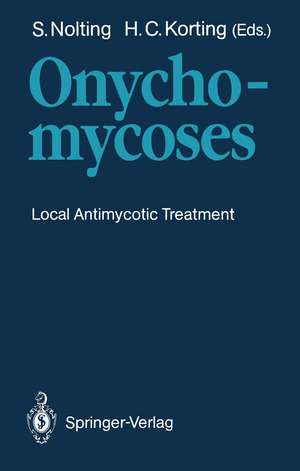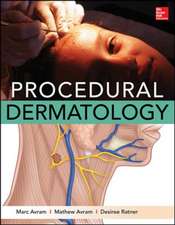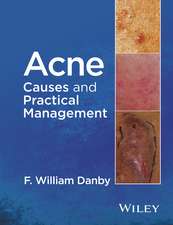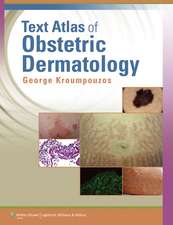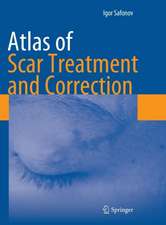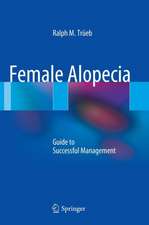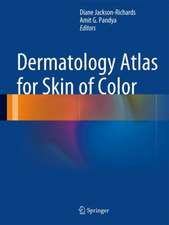Onychomycoses: Local Antimycotic Treatment
Editat de Siegfried Nolting, Hans C. Kortingen Limba Engleză Paperback – 28 dec 1989
Preț: 643.20 lei
Preț vechi: 677.05 lei
-5% Nou
Puncte Express: 965
Preț estimativ în valută:
123.08€ • 128.83$ • 102.44£
123.08€ • 128.83$ • 102.44£
Carte tipărită la comandă
Livrare economică 26 martie-01 aprilie
Preluare comenzi: 021 569.72.76
Specificații
ISBN-13: 9783540521327
ISBN-10: 3540521321
Pagini: 124
Ilustrații: X, 113 p.
Dimensiuni: 118 x 185 x 7 mm
Greutate: 0 kg
Editura: Springer Berlin, Heidelberg
Colecția Springer
Locul publicării:Berlin, Heidelberg, Germany
ISBN-10: 3540521321
Pagini: 124
Ilustrații: X, 113 p.
Dimensiuni: 118 x 185 x 7 mm
Greutate: 0 kg
Editura: Springer Berlin, Heidelberg
Colecția Springer
Locul publicării:Berlin, Heidelberg, Germany
Public țintă
ResearchDescriere
The human nail is formed from variably keratinized epithelial structures. The part of the nail organ which is the actual nail plate constitutes the end-product of keratinized cells produced by the matrix. The matrix cells lose their nuclei, become strati fied and keratinized, and are added to the firm nail plate al ready present. It is usually transparent or translucent, smooth and keratinous in structure, pushed forward by the keratin layer of the nail bed and growing out distally as a free edge over the finger/toe-tip. The transparent nail reveals the pink-coloured nail bed. Usually, a white half-moon shaped lunula is visible, extending under the proximal nail fold. The nail plate consti tutes a buttress to pressure. The rate of nail growth is greatest in the second and third decades oflife and declines slightly later. Increased nail growth may be noted during the summer and decreased growth in winter, in evident dependence on the peripheral circulation. Although the nail is not the primary site of attraction at a fleeting glance from others, changes in the nails are quite striking at a second look, and modern freedom of behavior means that changes in the toenails soon become very obvious, especially in women.
Cuprins
Epidemiology and Pathology of the Onychomycoses.- The Treatment of Onychomycosis in Clinical Practice.- An Alternative Treatment Concept in the Onychomycoses.- Oral Treatment of the Onychomycoses.- Possibilities and Limitations in the Recording of the Onychomycoses During Treatment.- Keratinolytic Agents in Dermatology.- Problems of Compliance in Patients with Onychomycoses.- Experience with Bifonazole/Urea in Germany.- Hospital Experience with Bifonazole/Urea.- Clinical Experience with Bifonazole/Urea.- Topical Treatment of Onychomycoses with Bifonazole-Urea Ointment.- Postface.
